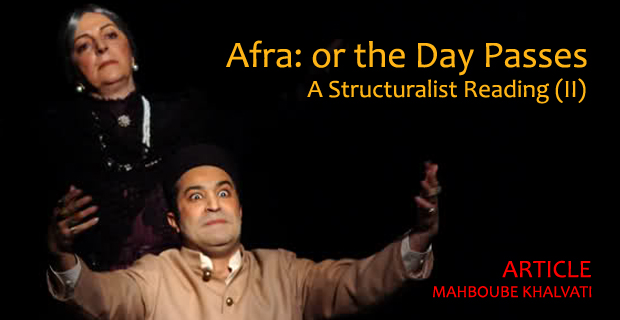
Afra, or the Day Passes by Bahram Bayzayi (b. 1938), the prolific Iranian screenwriter, playwright and director, was published in 1998 but was only premiered in 2009. It turned to a very successful performance which was warmly welcomed by the audience. The play is divided to no acts and no scenes; it just starts with every character giving an account of what is happening and also very brief references to the past. It, then, moves to their interactions and its aftermath. Every character introduces himself or herself at the beginning… READ THE FIRST PART HERE
Another level on which this very opposition can be overseen is in relation to Shazdeh Badrolmolouk. She is resistant to reality. She cannot accept that her family was once a royal family but not anymore. She still tries to show off the superiority of her blood. Close consideration reveals that actually she is bullying the people around her. She does whatever pleases her regardless of the rights of those on whom she is playing trick or those whom she is framing. She, like Afra, prefers illusion to reality. She also does such a thing to his son. In other words, she tries to limit him to the borders of the small world she has shortsightedly made for him. He is not allowed to transgress the borders of this world. He has been brought up as a prince; however, it seems that despite the fact that he is apparently insane, he understand the truth and reality better than his self-conceited mother.
Sarkar Khademi is another character whose story becomes meaningful once this reality/illusion opposition is looked into. However, his case can be distinguished from the other two ones by the fact that he moves from illusion to reality but the other two from reality to illusion. He deemed that he had been a useful member of the society who has been at people’s service for thirty years. Upon his retirement, he gives whatever he has done a second thought; hence his perception that he has done nothing special and has just been a very common policeman with no great achievements. He knows that it is too late for disappointment of this kind, so he thinks that he will return to where he came from and do the farming job. The turning point in his story is Afra’s imprisonment and his efforts towards her exoneration.
The reality/illusion opposition appears to be so simple and obvious on the surface. An in-depth consideration reveals that it underpins the whole theme of the play. Later in the play, this opposition again pops up under the guise of the truth/lie. This happens when Shazdeh Badromolouk frames Afra. Consequently everyone believes that the shoplifting has been Afra’s job. Even Hamid Shayan, the lover, suspects Afra, and paves the way for her and her family’s torture. No one can accept the reality, the truth about what Shazdeh Badromolouk has in mind for the poor teacher who is leading an honorable life with her family when light is thrown on everything.
The next major binary opposition revolves around the wealth/poverty binarism. This outstanding opposition is the foremost cause of all that happens in the play ranging from Afra’s and her family’s illusion about the imaginary cousin to Shazdeh Badromolouk’s proposing to Afra. Ironically, the dominant, that is the once royal family, is basically dependent on the poor and the low class family in order to secure their future. Shazdeh Badromolouk herself admits this fact “may God never make one dependent on this down-and-out people, whether they are social workers or teachers”(11). That is not to say that the subversive does not need the dominant’s money either. For example when Afra is suggested to teach Cholman Mirza, she says “yes ma’am, I will come because I’m in need. But I know that he won’t learn anything as far as he is constantly afraid of you” (35).
There are only a few people in the play who can live comfortably with their income. One is Sarkar Khademi who is working for the Government, that is, his salary is to some extent secure. The next one is Mr. Eghdami, the shopkeeper. However, he exaggeratingly claims that the shopliftings which have been happening recently will lead to his bankruptcy. Mr. No’e Bashari is also relaxed and not that concerned about how to earn his living. As a matter of fact, the main character obsessively concerned with this issue is Afsar Khanoum. She is too weak and sick to be able to do all Shazdeh Badromolouk’s errands. As she has asked her to send Afra to help at home, exactly what she does not wish to happen; she tries to harness all her power to do the errands on her own. She even discards the idea of telling Afra so, though later on we see Afra serving Shazdeh Badromolouk’s guests at her home which paves the way for her being unfairly framed.
The only person who seems to be taking benefit from the current situation is Shazdeh Badromolouk. By always reminding people that whatever they have is from her property, she makes them obliged to her.
Finally, the last significant binary opposition in the play is the opposition between being Tehrani/Shahrestani. Some of the characters have immigrated to Tehran, for example Afra’s family due to her father’s job had to come to Tehran years ago. The society has not been able to absorb these people; therefore whatever bad event takes place Tehrani people attribute it to the Sharestani ones. This discrimination seems to be constantly existent in the society, in several places in the play this very theme is concurring. A good example is with regard to Hamid Shayan, the bicycle man, who claims to be Afra’s lover. Once he gets informed of the shoplifting and Afra’s accusation, he says “who said that she passes her brother while he doesn’t deserve it? Why do you underestimate yourselves? At least you are from Tehran while they are Shahrestani. It is evident from your appearances that you are hotshots” (63). Later on in regard to Afra, Shayan says that “this Shahrestani girl talks in a way that makes me, a Teharni, feel like I’m a villager” (79). This opposition also encompasses the complacency/modesty one as well. Tehrani people in the play have clean forgotten that what makes a person respectable is his or her conduct and mentality and the way he behaves in the society rather than where he belongs to. This very fact makes them so complacent and conceited. Shazdeh Badrolmolouk also refers to Afra as Shahrestani. Interestingly enough, although Afra knows the true intentions of Shazdeh Badrolmolouk, she remains very faithful and respective. She always admits that it is so kind of her to help her mother and give them some gifts sometimes.
Classifying the events happening in the play in the light of the binary oppositions should not lead to the oversimplification of either the themes to be conveyed or the play’s structure. This essay aims at introducing the oppositions around which the story revolves and provide some clues to the better understanding of the play. As mentioned earlier, these oppositions are closely interrelated. Additionally they produce a network through which the reader comes to grasp the meaning and the messages each part of the play is going to imply.


Leave a Reply